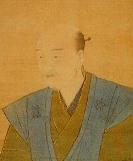




Bord in 1560 in the town of Ishida in Omi, Mitsunari started working under Hideyoshi from the time he was 15, and was thereafter devoutly loyal to his lord. He fought at Yamazaki, Shizugatake, and Nagakute with Hideyoshi, and would eventually come to be known as his right-hand man. He would also become one of the city of Sakai's bugyo. Though he did well during the Kyushu campaign, taking charge of the revitalization of Hakata, he showed his ineptness at battle while trying to attack the castles of Tatebayashi in Kozuke and Oshi in Musashi during the Odawara campaign. Mitsunari was not much of a general, but he excelled in administrative affairs, and fortunately for him this was recognized by Hideyoshi.
When in 1592, Hideyoshi decided against going to Korea himself, Mitsunari, along with Otani Yoshitsugu, Mashita Nagamori, and others, went to assist the commander Ukita Hideie as Chiefs of Staff. It was here where Mitsunari made many of his enemies. Kato Kiyomasa called him a "civilian meddling in military affairs." And when he publicly denounced Kobayakawa Hideaki as incompetent, this probably was a large reason for the latter to turn into a turncoat once Sekigahara was to start.
Another reason Mitsunari was unpopular was the fact that he was seen as a parvenu in military affairs, seeing as he was so much more adept at 'white collar' work. Yet another was his blunder at Osaka castle while attempting to take Tokugawa retainer families hostage, resulting in Hosokawa Gracia's suicide. Finally, Mitsunari simply lacked the prestige Ieyasu did.
Following Hideyoshi's death in 1598, there was an obvious power vacuum. Tokugawa Ieyasu meanwhile was busy marrying off his children to other daimyo, conduct which opposed what a Tairo such as he was legally allowed to do. Using this as a pretext, Mitsunari started recruiting daimyo who were interested in taking up the cause against Tokugawa.
During the battle itself, Mitsunari was at the head of 6000 troops, and was attacked fiercely throughout, not only because he was the commander of the western army, but because of the animosity many of the eastern generals felt towards him. Following Sekigahara, Mitsunari escaped, but was caught six days later at Furuhashi in Omi, his mother's hometown. He was beheaded ten days after that.
Mitsunari has been called a "slanderer," and an "upstart," and even "evil," but it must also be remembered that history is written by the victors. It should be remembered that if Ieyasu had lost Sekigahara, Ieyasu certainly would not be revered today as Toyogu.
Mitsunari was certainly intelligent, and charismatic to have convinced many 'big name' daimyo to join into his alliance. With a relatively small financial base of 190,000 koku, he was able to orchestrate a battle which would make or break the fates of all major daimyo in the nation. He was also fiercely loyal. There is a story which relates that before he, Ankokuji Ekei, and Konishi Yukinaga were to be executed, a delivery came which had in it three kosode, a kind of clothing. Though the latter two gladly accepted them, Mitsunari questioned "Who are these from?" To which the reply was "From our highness in Edo." Mitsunari retorted, "Besides Hideyori, there is no highness. Since when does Ieyasu have the right to use this title!"
He died at the age of 40.
 |
 |
 |
 |